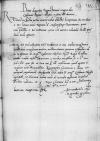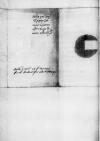List #6241
Bona Sforza do Ioannes DANTISCUSCracow (Kraków), 1531-02-23
| odebrano Antwerp, [1531]-03-31 Rękopiśmienne podstawy źródłowe:
Publikacje:
| ||||||
Tekst + aparat krytyczny + komentarzZwykły tekstTekst + komentarzTekst + aparat krytyczny
Reverendo in Christo paper damaged⌈[hristo]hristo paper damaged⌉ Patri, Domino, domino Ioanni paper damaged⌈[domino
Reverende in Christo Pater, sincere nobis dilecte.
Scripsimus ita, ut voluit
S(trenuitas) or S(inceritas)⌈S(trenuitas)S(trenuitas) or S(inceritas)⌉
Tua litteras nostras reverendo domino
De nego text damaged⌈[o]o text damaged⌉tiis nostris ad praesens nihil scribimus S(trenuitati) or S(inceritati)⌈S(trenuitati)S(trenuitati) or S(inceritati)⌉ Tuae. Multis namque et superinscribed⌈etet superinscribed⌉ variis litteris nostris scripsimus antea, nullum tamen optatum responsum ab ea rec text damaged⌈[c]c text damaged⌉epimus. Et magnificus Ludovicus Aliphius, serenissimi regis et noster orator, scribit nihil litterarum a multis mensibus se a S(trenuitate) or S(inceritate)⌈S(trenuitate)S(trenuitate) or S(inceritate)⌉ Tua habuisse, quo fit, ut tam nos quam ille nesciamus, quid agatur in negotiis nostris Barensibus. Quapropter hortamur S(trenuitatem) or S(inceritatem)⌈S(trenuitatem)S(trenuitatem) or S(inceritatem)⌉ Tuam, ut quicquid expediverit duplicatis litteris nobis et magnifico Ludovico Aliphio significet, ut sciamus rebus nostris de remedio opportuno consulere.
Bene valeat S(trenuitas) or S(inceritas)⌈S(trenuitas)S(trenuitas) or S(inceritas)⌉ Tua.
Dat(ae) or Dat(um)⌈Dat(ae)Dat(ae) or Dat(um)⌉
Ex mandatum serenissimae maiestatis reginalis proprium
Bona regina subscripsit


 BCz3465, p. 184
BCz3465, p. 184